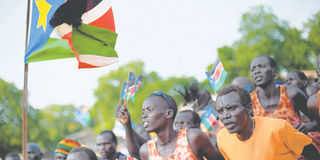Africa’s newest nation is born

People dance at a part organised by Sudan People Liberation Army on Tuesday, four days before birth of a new nation
After 55 years of struggle, South Sudan this Saturday becomes an independent state.
The South is now free from what they see as the “oppressive” North.
Africa on the other hand is preparing to receive the 56th state. But how will life be like in an independent South Sudan? There has been apprehension that the North is not likely to let go the South easily, given the current skirmishes in Abyei and Southern Kordofan.
Despite separation, the North will still remain the South’s most important neighbour.
The bitter rivalry that has characterized the relations between the two will have to be put aside for the sake of cordial bilateral relations.
Yet, there is anxiety about the unresolved post-referendum issues which include, Abyei, citizenship, oil wealth and infrastructure, the North/South border, currency and external debt. Africa through the continental body, African Union (AU) has been trying to ensure that the secession is smooth and that there will be no call to arms.
However, the emerging economy in the region provides a wide range of opportunities for investment and trade. In particular, Kenya, that played a key role on the Sudanese peace process, is looking up to the South as a new market for its manufactured goods and a source of employment for her citizens.
The sectors open for foreign investment include, mining, quarrying, energy and electricity, petroleum and gas industry, transport and ICT, tourism and hotel industry development, security services, freight and logistics and risk analysts.
While the oil resource in South Sudan has been given undue attention by the rest of the world, the new republic has even bigger potential in mining and agriculture. With about 80 percent of its land being arable, South Sudan is capable of ensuring food security in the entire Eastern African region that comprises 12 countries.
Although South Sudan is currently a net importer of agricultural products, the region has an outstanding natural resource base for the production of a wide range of crops, timber and other forest products, fisheries and livestock.
Key constraints that face the development of the agricultural sector include inadequate financial services, low use of improved technologies, poor rural infrastructure that hampers access to markets, weak or no agricultural and livestock research and extension services, and shortage of skilled labour.
Thus, the following sectors have the potential for domestic and international investors: rain-fed mechanized schemes for grains and cash crop production, irrigated sugarcane farms, fruit and vegetable production and processing, Gum Arabic, timber and wood production and processing, dairy and poultry farming, veterinary services and pharmacies, fish production, agrochemicals and machineries.
The new independent South has expressed willingness to join the East African Community (EAC) trade block, given that 90 percent of her trade is with the East African region. South Sudan provides a ready market to consumer products and services.
Still, infrastructure and markets need to be developed and equitable access to essential services must be put in place. For instance there is only one telecom company based in South Sudan. People need health services and yet there is only one main hospital. Education, especially primary, vocational and other tertiary institutions need to be developed.
However, the biggest challenge for the new republic will be assuring foreign investors of the security of their investment and human life. Being a region emerging from two decades of war, there are still too many weapons in the wrong hands, a development that has the potential of scaring away would-be investors.
President Salva Kiir has a huge task ahead of him. For one, he has to assure the North that an independent South Sudan will not be a hostile neigbour. He also has to disarm the militias that still possess arms contrary to the peace agreement.
But the most important thing for an independent South is how it is likely to deal with her other neigbours, Kenya, Uganda and Ethiopia. Kenya is upbeat that an independent South Sudan will expand the markets for her goods and services. Indeed, part of Kenya’s Vision 2030 economic blueprint is pegged on the emerging market in South Sudan.
Uganda on the other hand is seeking a stable buffer zone on its northern border to ensure that the rebel Lord’s Resistance Army (LRA) does not return into active insurgency. Ugandan trade with South Sudan has tripled in recent years, with South Sudan being the largest importer of Ugandan goods.
Ethiopia, on the other hand, is both optimistic and lukewarm towards South Sudan’s independence. While Ethiopia has embraced South Sudan with many of her nationals doing business in Juba, especially in the hospitality and transport industry, the Addis Government is a bit jittery that an independent South Sudan will give ideas to separatist movements in the south (Oromo Liberation Front) and east (Ogaden).




